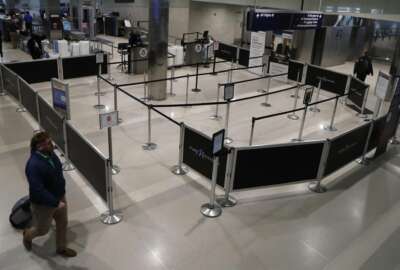To listen to the Federal Newscast on your phone or mobile device, subscribe in PodcastOne or Apple Podcasts. The best listening experience on desktop can be found using Chrome, Firefox or Safari.
- Congresswoman Jennifer Wexton (D-Va.) wants to let federal employees easily carry over their unused leave to the next year. She says taking time off isn’t an option for some employees who are working through the pandemic. Most federal employees are usually allowed to carry over up to 30 days of accrued annual leave to the next year. Anything left is usually lost. Current statute does allow employees to carry over unused leave in certain situations. But Wexton’s bill would specifically designate the coronavirus pandemic as one of those situations. The Federal Frontline Worker Leave Protection Act has four other co-sponsors.
- A bipartisan group of senators is pushing the Trump administration to provide hazard pay for federal employees. Senators Chris Van Hollen (D-Md.) and Susan Collins (R-Maine) led 17 of their colleagues in writing to the Office of Personnel Management and Office of Management and Budget. The senators say OPM should go ahead and approve hazard pay for employees working on the frontlines of the pandemic. They’re also urging OPM to give agencies clear guidance on how employees could reasonably balance work and family schedules without taking leave. (Sen. Chris Van Hollen)
- Service members have been putting themselves in danger responding to coronavirus and one lawmaker thinks they should be paid like it. Senator Joni Ernst (R-Iowa) is proposing a bill that will provide tax-free hazardous duty pay for National Guard members working during the COVID-19 crisis. Ernst’s bill would provide at least $150 in monthly tax-free hazard duty pay with back pay for Guardsmen, active duty service members and other military medical corps professionals. There are currently more than 46,000 National Guard members working in response to the coronavirus.
- A new tool from the Department of Veterans Affairs is tracking coronavirus cases among veterans and its employees in real time. VA is now counting active cases and cases where the patient has been discharged or 14 days have passed. VA data shows nearly 9,800 total cases among veterans and employees across the country. The tool shows 418 active cases among VA employees, and another 3,000 cases among veterans or civilians treated at VA hospitals. 24 VA employees have died due to complications from COVID-19.
- The Office of Special Counsel called out a Veterans Affairs hospital for a policy that denied veterans in-home services. A policy in Murfreesboro, Tennessee had the effect of denying all veterans on its electronic waitlist, social work programs delivered at home. That, regardless of what clinicians determined were the vets’ medical needs. A whistleblowing social worker raised the issue at the Tennessee Valley Healthcare System. Social workers checked on seventy three patients, and found eight of them had died. VA has instituted corrective measures.
- The Pentagon is increasing progress payments to businesses it works with to keep their cash flow going during the coronavirus pandemic. One senator is concerned about how the money will be used though. Senator Elizabeth Warren (D-Mass.) sent a letter to DOD’s acquisition chief asking how much money will be sent to companies and how long the new policy will last. She’s mostly worried that the new policy may allow large contractors to get more of their costs reimbursed before paying subcontractors for their work.
- The Defense Department made $7.5 billion in improper payments last year – a dramatic increase from the $1.2 billion it reported in 2018. The Defense Department says the larger figure came about because it started more rigorous audits of its military pay accounts last year. But DoD’s inspector general says that points to a broader problem: the department’s own estimates of its improper payment rates are unreliable. In a new audit, the IG says DoD is still reporting unreliable figures for five out of the eight major spending accounts it tracks for improper payments. The IG says it’s the eighth year in a row the department has failed to comply with the Improper Payments Elimination and Recovery Act.
- The CXO Fellows program is accepting applications for the new group of candidates. If you are a GS-9 or above, the fellows program wants to help develop your leadership skills in the acquisitions, finance, human capital, and information technology fields. During the year-long program, fellows meet with leaders in the federal management community and learn about innovative government operations through seminars and “Inside Government” events. Applications are due by June 12.
- Senate Intelligence Committee Chairman Richard Burr (R-N.C.) says he wants a quick confirmation of Congressman John Ratcliffe (R-Texas) to be the permanent Director of National Intelligence. The Senate committee held a nomination hearing yesterday under new social distancing protocols. The ODNI has been under acting leadership for several months. Senators asked Ratcliffe about his views on whistleblowers and the role of the intelligence community in the current administration. Ratcliffe says he’ll respect whistleblower protections under the law. The ODNI has been under acting leadership for several months.
- Nine former inspectors general are urging Congress to set up greater protections for their colleagues. The former watchdogs ask House and Senate leadership to pass a bill that would limit the president’s ability to remove an IG, unless they fail to meet their statutory duties. They also urge President Donald Trump to give greater consideration to a list of IG candidates already vetted by the Council of the Inspectors General on Integrity and Efficiency when filling IG vacancies. These requests come after Trump fired intelligence community IG Michael Atkinson and removed former acting Defense Department IG Glenn Fine as chairman of Pandemic Response Accountability Committee.
- Former USPS inspector general David Williams resigned from the agency’s board of governors. His term expired last December, but Williams stayed on the board as part of a one-year holdover. The board still has a quorum with six members. Prior to his roles at the Postal Service, Williams served as the IG for the Nuclear Regulatory Commission, the Social Security Administration and the Treasury Department. He also served as the first Treasury IG for Tax Administration and as the director of the Office of Special Investigations at the General Accounting Office. (Postal Regulatory Commission)
- The percentage of agency email in the cloud made a big jump over the last three months. New data from the Office of Management and Budget shows 79% of all email boxes are in the cloud among the 24 CFO Act civilian agencies. A 4% increase since December. It’s also the highest percentage of email boxes in the cloud since OMB began tracking this goal under the President’s Management Agenda. At the same time, one fewer agency met the governmentwide goal of having 95% of all email in the cloud. The State Department dropped the number of its email boxes using cloud services by 3%. DHS made the biggest jump since December by adding 25% more email boxes to the cloud. (Performance.gov)
Copyright
© 2025 Federal News Network. All rights reserved. This website is not intended for users located within the European Economic Area.



